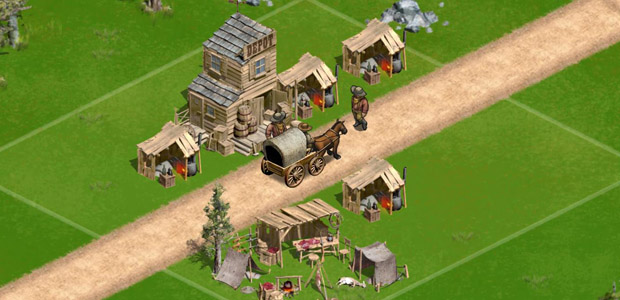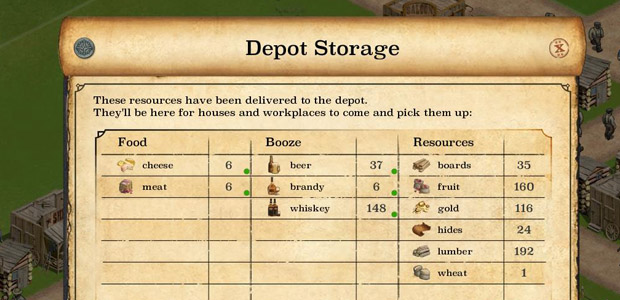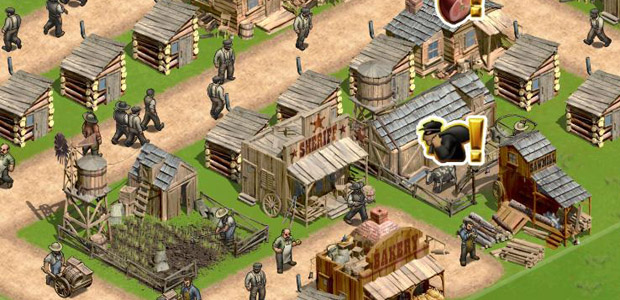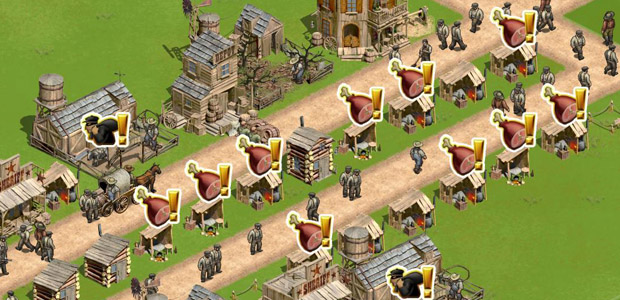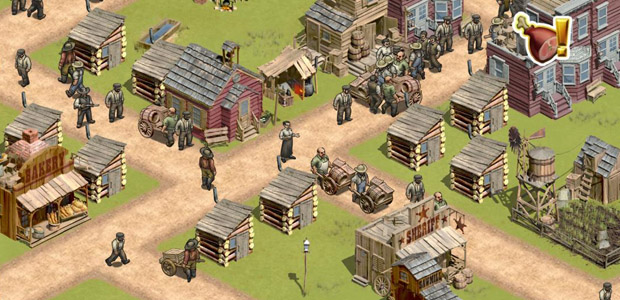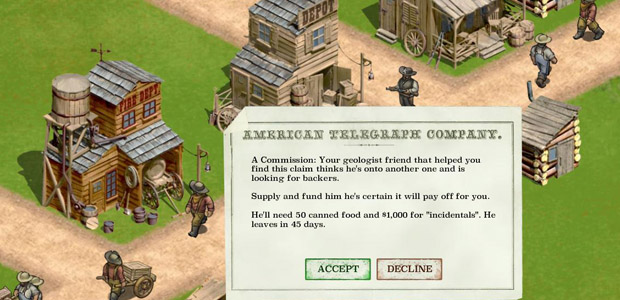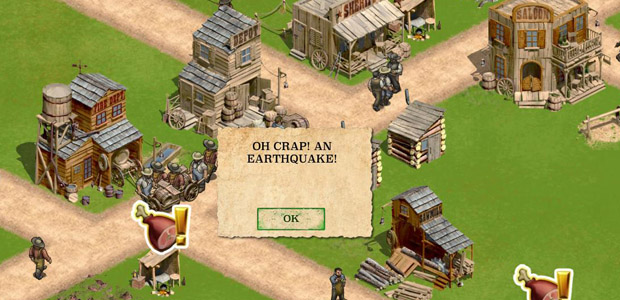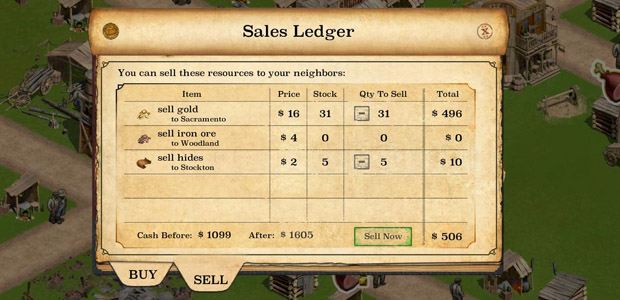The Lighthouse Customer: 1849
How the West Made Buns
Each Monday, Chris Livingston visits an early access game and reports back with stories about whatever he finds inside. This week, wild west management in 1849.
How-do, pardner! I know you're accustomed to a ton of shootin', lootin', rootin' and/or tootin' in your wild west games, but rarely do they address the real complexities of frontier life. For instance, where did the fabric needed to sew all those enormous calico dresses come from? Who provided the lumber and fashioned the boards to build the O.K. Corral? How did gunslingers acquire olive oil to daintily dip their sourdough bread into? Finally, those head-scratchin', long-lingerin' questions have been answered in the early access wild-west management game 1849 from Somasim. Reach for it, cowboy! Not your gun, your sales ledger!
Since 1849's sandbox mode isn't yet complete, the only way to currently play is in Story Mode. It takes you across the great state of California, building one town at a time and meeting specific goals in order to advance. In the town of Novato, build a few houses on your settlement, stockpile some hides by building a hunting camp, and open a trade route to import lumber. In Stockton, build a wheat farm for a bakery, a vineyard for a winery. In Sacramento, there's a certain urgency to pan rivers for precious metals in what could be described as, I suppose, a "rush" for gold. In Live Oak, perhaps the biggest challenge of all: building a town people might actually want to raise children in, with actual decent homes instead of just stinky cloth tents and creaking wooden shacks. Also, discover oil. Olive oil, that is!
Building towns begins with placing lots for homes, and as settlers arrive, building places for them to work, connecting those places with roads, and fabricating and distributing goods through the town's supply depot, all while minding your budget. While towns may produce multiple goods, no town can be completely self-sufficient and trade routes must be opened with other settlements across California. Naturally, as towns grow, problems grow. Your town may produce wheat and lumber, but your imports will include fabric, beer, and trouble.
I've been managing Sacramento, which also happens to be the actual city I live in. In the present day I see Sacramento's biggest problems as our shitty basketball team, a complete lack of movie pubs, and the inability to attract decent stand-up comedians, but it's a little different in the old west version. My number one problem at the moment seems to be crime. While a saloon is a big draw for a potential citizens, it also introduces a seedier element to the populace: the outlaw. My precious ramshackle buildings are being robbed left and right, and my lone sheriff seems unable to stop them. Even my farms are constantly being burgled.
Which raises a question. How does one rob a wheat farm? In a bank robbery, enough loot can be stuffed into a bag with a dollar sign drawn on it. As heavy as gold is, a moderately-muscled robber could still carry off enough in his arms to make it worthwhile. But wheat? How much wheat, logistically, could a robber carry? Enough to make a loaf of bread, maybe, after all the backbreaking labor involved in stripping the grain from the stalks and grinding the grain into flour and mixing the flour with yeast and all the other steps I just found on a children's website about how wheat gets made into bread. Why not set your sights on the end of the production chain and just rob the bakery, making off with a saddlebag of fresh buns? Oh, wait, my bakery has been robbed as well.
Perhaps as the result of the great wheat heist and bakery score, everyone in town is raising angry ham icons above their homes to signify their hunger, and despite adding another sheriff's office, the robber continues to play his own game of wild west management that is superior to mine. Finally, I tear down the saloon completely, hoping that will give the Wheat Bandit nowhere to trade his illicit, handmade dinner rolls for whiskey.
Buildings can do more than produce goods and get robbed. They can also be upgraded. Some, like houses, grow bigger on their own in the right conditions, and some can be improved with money or materials. To meet my wine quota in the town of Live Oak, for instance, I need to build bigger vats to store my wine, meaning I need more boards to build the vats, meaning I need to improve my sawmill to produce more boards, meaning I need more lumber, requiring improvements to my logging camps. This complex, symbiotic dance is a good reminder that the wild west activities we all know and love, like shooting an outlaw off the roof of the general store or making love to a prostitute in a brothel's old timey bathtub, required strict management of an intricate supply line. Remember this the next time you watch Once Upon A Time In The West. That signature harmonica took the collaboration of eleven different industries before it could reach Charles Bronson's mouth so he could play Ennio Morricone's haunting notes.
During lulls in my fast-paced life of buying and building, it's enjoyable to sit back and watch the tiny citizens go about their business. If you don't have enough industry, unemployed workers will wander the streets, looking for jobs. Order supplies from another city, and you'll see a wagon roll into town with your goods. The farmer works in the vineyard, his employee pushes a cart to the winery, the winery delivers full vats to the depot, and the depot inventory gets updated. It's not just a clutter of citizens to make the town look busy, they're actually doin' stuff! Except the sheriff. He walks around uselessly with his eensy gun, oblivious to the constant burgling.
There are also little events now and then. A commission comes in from time to time, usually to stockpile certain resources or to trade with another town for a set amount of goods. There are natural disasters like fires and earthquakes which will have you scrambling to clear rubble or hurriedly building that firehouse you never bothered with.
As with all management games, I struggle to stay afloat because I always want to build all of the buildings all of the time, immediately. Give me a selection of five different buildings, and my choice is yes. Stockpiling goods is also tough: upgrading requires loads of resources, and it can be hard watching townsfolk clambering for booze or lumber when I'm trying to fill out my wine cellars or sell wood to Stockton to meet a quota. Other scenarios involve building canneries for tinned meat, distilleries for whiskey, orchards for fresh fruit, stone masons, carpenters, cobblers, tailors, and a host of other old-timey businesses to be run, presumably, by a balding fellow with round spectacles, muttonchops, and a filthy smock.
A soothing, twangy soundtrack has recently been added, and sound effects are slowly being patched in (when I played, my towns were silent as a tombstone). There's unfortunately no way to rotate buildings, however. While it doesn't hamper gameplay (as long as a road is touching a building it's usable), it would be nice to swivel things around a bit from an aesthetic standpoint. Apparently, the old west had strict building codes along with its insatiable desire for ham.
1849 is available for early-access purchase on IndieGameStand and is a part of Steam Greenlight.

